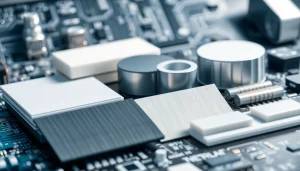Choosing the Right Power Supply Manufacturer for Your Electronic Needs

Understanding Power Supply Manufacturers
Power supplies are critical components in virtually every electronic device, providing the necessary energy for operation. With the increasing demand for efficient, reliable, and innovative power solutions, power supply manufacturers play a vital role in supplying the market with a variety of products tailored to diverse applications. Understanding what these manufacturers do, the types of products they offer, and the industries they serve can empower buyers to make informed decisions.
What Does a Power Supply Manufacturer Do?
Power supply manufacturers design, produce, and distribute devices that convert electrical power from one form to another. This conversion can involve changing AC to DC, providing voltage regulation, and ensuring stable current output for various devices. The manufacturers typically undertake the following:
- Research and Development: Innovating and enhancing product performance, efficiency, and safety.
- Manufacturing: Utilizing advanced techniques to produce power supplies at scale, ensuring quality control throughout the production process.
- Testing and Quality Assurance: Rigorous testing to ensure compliance with industry standards and certifications.
- Distribution: Establishing partnerships with distributors to bring products to market efficiently.
Types of Power Supplies Offered
Power supply manufacturers typically offer a range of products designed for various applications. These can be categorized into three main types:
- Linear Power Supplies: Known for their simplicity and reliability, linear power supplies provide a stable output voltage. However, they are less efficient compared to switching power supplies and are often larger and heavier.
- Switching Power Supplies (SMPS): More prevalent due to their compact size and efficiency, these supplies work by switching the input power on and off rapidly, thus allowing for size reductions. They are commonly utilized in consumer electronics and industrial applications.
- Uninterruptible Power Supplies (UPS): These systems provide backup power during outages, ensuring that sensitive equipment remains operational. UPS units are vital for data centers, medical equipment, and critical infrastructure.
Key Industries Served by Power Supply Manufacturers
Power supplies are foundational across multiple sectors. Here are some key industries that rely on power supply manufacturers:
- Consumer Electronics: Devices such as computers, televisions, and smartphones require reliable power supplies to function correctly.
- Automotive: The automotive industry uses power supplies for everything from electric vehicle charging systems to onboard electronic systems.
- Telecommunications: Power supply systems are crucial for communication infrastructures, ensuring uninterrupted connectivity.
- Industrial and Manufacturing: Power supplies are used in robotic systems, production equipment, and automation technologies.
- Healthcare: Medical devices often depend on precise and reliable power supplies for life-saving operations and diagnostics.
Criteria for Selecting a Power Supply Manufacturer
Choosing the right power supply manufacturer is critical to the overall success of a project. Various criteria should be considered to ensure compatibility with your needs and expectations:
Evaluating Product Quality and Reliability
The quality of power supplies can drastically affect equipment performance. Here are some metrics to evaluate:
- MTBF (Mean Time Between Failures): A standard metric used to evaluate the reliability of power supplies. Look for manufacturers with high MTBF ratings.
- Efficiency Ratings: Look for products compliant with energy efficiency standards such as 80 PLUS, which indicates a focus on energy conservation and lower operating costs.
- Warranty and Support: A manufacturer that offers extended warranties often stands by the quality of their products. Excellent customer support can also facilitate troubleshooting and maintenance.
Importance of Certifications and Standards
Certifications ensure that power supplies meet industry standards for performance and safety. Key certifications to look for include:
- ISO 9001: Indicates quality management standards.
- UL Certification: Ensures safety in electrical components.
- CE Marking: Indicates compliance with European safety standards.
- RoHS Compliance: Ensures that products are free from hazardous materials.
Comparing Manufacturer Reputation
Researching the reputation of a power supply manufacturer can often provide insights into their reliability and customer satisfaction. Consider:
- Industry Experience: Manufacturers with a long history typically have established quality and service standards.
- Customer Reviews: Reading feedback and testimonials from existing customers can reveal strengths and weaknesses.
- Industry Awards: Recognition from industry organizations can indicate a manufacturer’s commitment to excellence.
Top Power Supply Manufacturers in the Market
When searching for power supply manufacturers, understanding the industry landscape is crucial. Below are some of the top players:
Industry Leaders and Their Offerings
Several manufacturers are recognized globally for their comprehensive range of power supplies:
- MEAN WELL: Offers a wide array of power solutions ranging from 0.5W to 25600W, widely used in industrial applications.
- XP Power: Focuses on AC-DC power supplies and DC-DC converters, providing high-quality solutions tailored to customer needs.
- FSP Group: Known for its versatile range of AC-DC power supplies, UPS systems, and energy storage products. FSP has a significant market presence and innovation.
- Wall Industries: Provides power supplies and converters since 1961, focusing on reliability and custom solutions for a range of industries.
Emerging Competitors to Watch
While established brands dominate the market, keep an eye on emerging companies that are innovating with new technologies:
- Aegis Power Systems: Specializes in custom power supplies, catering to niche requirements across industries.
- Corsair: Known largely in the gaming community, Corsair is expanding its reach into high-performance power supplies for PC gaming.
- Seasonic: Valued for its high-quality PSUs, particularly in the enthusiast PC market, it continues to receive rave reviews from consumers.
Customer Reviews and Feedback Analysis
Analyzing customer feedback can offer a wealth of information about a manufacturer’s products. Look out for common topics indicated in reviews, including:
- Performance Issues: Note any recurring issues related to efficiency or reliability.
- Customer Support Experiences: The responsiveness of customer service can significantly impact user satisfaction.
- Value for Money: Assess how customers perceive the pricing in relation to product quality.
Best Practices for Working with Power Supply Manufacturers
Establishing a fruitful relationship with power supply manufacturers can lead to better outcomes for your projects. Here are some best practices to consider:
Establishing Clear Communication
Effective communication is essential for successful collaboration. Consider the following:
- Define Expectations Upfront: Outline project goals, deadlines, and specifications clearly from the start.
- Regular Updates: Schedule regular check-ins to assess project progress and address any issues promptly.
- Document Everything: Keep records of communications, agreements, and any changes discussed throughout the project lifecycle.
Negotiating Pricing and Terms
Price is a significant factor in manufacturing partnerships. Here are some tips for effectively negotiating:
- Research Pricing Trends: Understand the market rates for power supplies, ensuring you are well-informed during negotiations.
- Leverage Bulk Orders: Consider negotiating for better pricing terms based on the volume of your order.
- Discuss Payment Terms: Be clear about your payment capabilities and timelines to align with the manufacturer’s terms.
Ensuring After-Sales Support and Services
Post-purchase support is essential for maintaining long-term relationships and equipment reliability. Ensure the following:
- Clarify Warranty Policies: Understand the warranty terms associated with the product, including what is covered and for how long.
- Inquire About Technical Support: Ensure that the manufacturer provides adequate after-sales support for troubleshooting and maintenance.
- Feedback Loop: Establish a system to relay performance feedback back to the manufacturer, which can help in improving future versions of the product.
Future Trends in Power Supply Manufacturing
The power supply market is rapidly evolving due to technological advancements and shifts in global demands. Here are some trends to watch:
Technological Innovations to Anticipate
As technology progresses, manufacturers are embracing innovations that enhance performance and efficiency:
- Integration of Smart Technology: Smart power supplies that can communicate with IoT devices will allow for better energy management and diagnostics.
- Increased Efficiency Standards: Manufacturers are investing in R&D to meet stringent energy efficiency regulations.
- Advanced Cooling Techniques: Innovations such as liquid cooling are being developed to enhance thermal management in high-performance power supplies.
Impact of Sustainability on Manufacturing Practices
With growing environmental concerns, manufacturers are increasingly focusing on sustainable practices:
- Eco-Friendly Materials: The use of recyclable and non-toxic materials in production processes is becoming more prevalent.
- Energy-Efficient Designs: There is a shift toward designing power supplies that consume less energy and thus have a lower environmental impact over their lifecycle.
- Sustainable Manufacturing Processes: Manufacturers are adopting green technologies in production, reducing waste and emissions.
Predicted Market Changes and Opportunities
The power supply sector is poised for significant transformation in the coming years:
- Increase in Electric Vehicles (EVs): As the EV market grows, there will be a correspondingly increasing demand for robust and efficient power supplies.
- Rising Demand for Renewable Energy Solutions: Power supplies that cater to solar and wind energy applications will see increased demand.
- Global Expansion: Emerging markets will present new opportunities for power supply manufacturers to grow their footprint.






